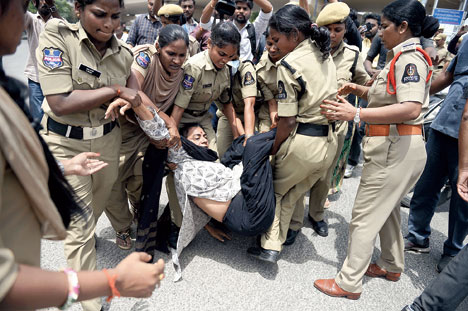
Mumbai: A public prosecutor has been quoted as telling a Pune court on Wednesday that the five activists and lawyers arrested in a multi-state crackdown had formed an "anti-fascist front" to "overthrow the government".
This newspaper could not corroborate the statement with the public prosecutor but a journalist and a police officer present in the court said the phrase "anti-fascist front" was mentioned.
A public prosecutor represents the State. If confirmed, the choice of phrase would go down as the first official confirmation of what critics of the Narendra Modi government have been accusing it of: that it has become "fascist".
It would also signify a rare instance when fascism -- characterised by dictatorial power, forcible suppression of the Opposition, strong regimentation of society and of the economy and promotion of national rebirth from decadence - was projected as something other than a pejorative.
Prosecutor Ujjwala Pawar was quoted as telling the sessions court in Pune: "All the accused had together formed the All India United Front, which is nothing but an 'anti-fascist front'. The front was formed entirely to overthrow the government.
"They are not innocent: they are intelligent people; they engage in recruitment; they engage in training; in dealing of arms."
The phrase itself is not new. Former Pune police commissioner Ravindra Kadam had earlier this month said the Parishad had no Maoist links but alleged that an "anti-fascist front" was behind the event.
Only Varavara Rao, Arun Ferreira and Vernon Gonzalves were produced before the sessions court because two high courts in northern India had already stayed the transit remands of Sudha Bharadwaj and Gautam Navlakha, who were put on house arrest.
While the court proceedings were on in Pune, news arrived that the Supreme Court had directed house arrest for all five accused, prompting the sessions court to iterate the order.
The five had been arrested in connection with the January 1 Bhima-Koregaon caste violence near Pune and an alleged conspiracy to assassinate Prime Minister Narendra Modi.
Pawar produced several letters that she claimed the Pune police had seized. She said these established that the accused had sought support from Kashmiri separatists to "overthrow the government" and had contacted arms dealers in Nepal.
All the accused should be remanded in police custody on the grounds of these letters in order to protect the sovereignty of India, the peace of India and the livelihoods of the people of India, the prosecutor said.
She accused Rao of being the conduit for procuring arms from Nepal and alleged that Ferreira's photo exhibitions on lynchings were meant to create anti-government sentiments among the young.
Pawar alleged a conspiracy behind the fact-finding committees on lynchings or atrocities that many of the accused participated in.
"Funds were routed in the garb of fact-finding. One of the letters mentions one Comrade Rao ranting about not receiving Rs 15 lakh in time," she said.
The prosecutor added that the November 2016 demonetisation had made it difficult for the accused to raise funds.
Defence counsel Rahul Deshmukh asked what was illegal about fact-finding committees. "What is wrong in that?" he asked.
Another defence lawyer, Rohan Nahar, contended that the Unlawful Activities (Prevention) Act did not apply to this case as no firearms, explosives or hazardous radioactive substances had been found on the accused or been used in Bhima-Koregaon.
"What is the incitement that the police believe (amounted to) waging war against the state?" Nahar asked.
A man was killed in Bhima-Koregaon near Pune in a caste clash after an annual commemoration of a Dalit army's defeat of the Brahmin Peshwa rulers in 1818.
Of the 10 people arrested in the case till Tuesday, only Dalit rights activist Sudhir Dhawale is mentioned in the FIR, filed on January 8.
Joint commissioner of Pune police Shivaji Bhodake had told reporters that the sleuths had gathered evidence of a plot to target the "highest political functionaries".
"We have seized laptops and pen drives from where we could retrieve much information. There was a plan to target the highest political functionaries," he said. "Some of them were also in touch with Kashmiri separatists. The Elgaar Parishad that sparked the violence in Bhima-Koregaon was funded by Maoists."
Justice (retired) B.G. Kolse Patil, a former Bombay High Court judge and one of the organisers of the Elgaar Parishad, rejected the police claim about a Maoist link.
"The Elgaar Parishad was organised by me and Justice (retired) P.B. Sawant. Some 300 organisations participated. The police claim about the Elgaar Parishad's links with Maoists is false," Patil said.











